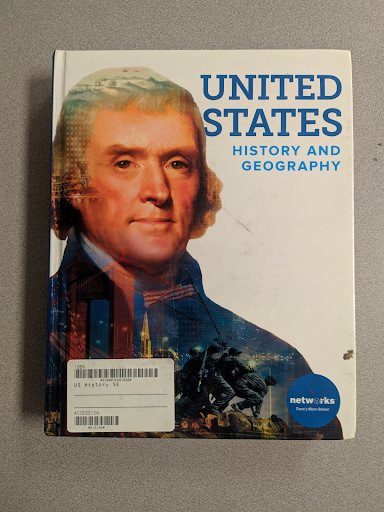Critical Race Theory Debate

US History Textbook
There has been a recent debate over the teaching of critical race theory in school. Georgia’s education board passed a resolution on critical race theory, discouraging it from being taught in schools. The conversation is on the tip of everyone’s tongues, with both sides having heated opinions on its place in schools. While one side of the aisle advocates for this change, they feel it betters the social studies curriculum and removes inherent biases. Others view this change with profound distaste, arguing that it will only stifle the range of curriculum being taught and censor some of the genuine hardships black Americans and other POCS in the country have endured.
With that in mind, interviewing wheeler staff and students to see the consensus they had on this topic seemed best. The first interviews conducted were with social studies teachers as these changes to the curriculum will have a lasting impact on the way of teaching. Sociology teacher Miss. Escott said, “This change in the curriculum was not needed as the social institution of school is one that students can feel comfortable in, but by removing one aspect in which students feel their stories were represented, it can make them feel not heard.” Miss Jean Ap Us History expressed her dislike for this change as she felt it “Limited the range of Us History that can be fully taught without censorship” because teachers not only have to worry about authentically representing history, especially those of minority groups whose history is already muddled. But the addition of this new change makes that accurate representation almost impossible, as teachers simultaneously have to balance that with the underlying pressure these new regulations enforce. And arguably, the social studies class most affected by these changes, Ethnic Studies, whose teachings are founded in Critical Race Theory and analyzing how those different race relations impact our everyday lives. Ethnic studies teacher Dr. Tidwell said he was disappointed with these new regulations, especially given how hard he had to fight to get ethnic studies implemented as a class
in the first place. Still, he was able to find a way to teach the course properly.
Although he’s been able to navigate those issues in his teaching and stay true to the core intentions of his class, this change has forced Dr. Tidwell to restructure his style while he’s been able to keep his core foundational teachings a challenge given the circumstances.
I’ve heard teachers share how these changes have affected them? But students are also impacted by this. Students were interviewed about CRT to see how they felt about these changes. One student, Cameron Smith(10), talked about how “It felt like they are silencing black voices and stories in social studies” this sentiment was echoed across multiple students. Rue Tshamla(12) said, “it’s disheartening as a black student to have to see our history which is already inaccurately represented put under further scrutiny.”
Overall it seems as if these new changes to the social studies curriculum are heavily disagreed upon. In combination with social studies, teachers feel like their ability to teach their material is being stifled and controlled. Many students, specifically POC students, are not fans of this change. It signified a lack of care for their history and accurate representation of POCS’s struggles. And overall leads many POC students to feel alienated as this isn’t a sentiment held only by wheeler students, but ideals held by many students all over the country. This debate continues to intensify nationwide but interviews held show a glimpse of how some wheeler students and faculty are viewing this!


Semi is a senior, and this is his first year taking journalism, which is his favorite class because all of his friends are in it. "The Ozarks" is his favorite...




